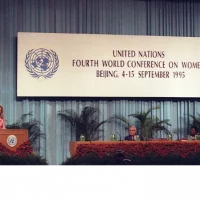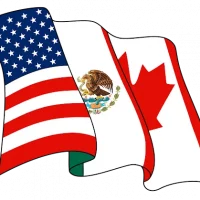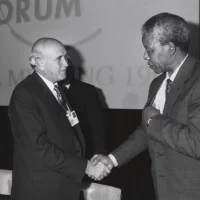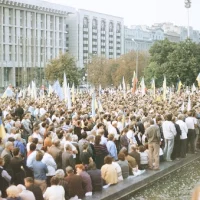“If there is one message that echoes forth from this conference, let it be that human rights are women’s rights and women’s rights are human rights once and for all.”—First Lady Hillary Rodham Clinton At the United Nations’ 4th World Conference on Women, which was held from September 4-15, 1995, several countries united in support… Read More "The Beijing Conference on Women"
It has its share of ardent supporters, who see it as a force for positive economic and social change, as well as die-hard opponents, who lament the loss of jobs and the damage done to some small towns and cities. Whatever the sentiment, it is hard to deny the tremendous effect the North America Free… Read More "The Birth of NAFTA"
The Search for Peace in Southern Africa – Oil, Angola, and the Proxy Wars
During the Cold War, the United States and the USSR engaged in a zero-sum game throughout the globe; while mutually assured destruction prevented the two nuclear superpowers from fighting a hot war, they did conduct an extensive war of proxies on nearly every continent. In the 1970s, just as Saigon – and American influence in… Read More "The Search for Peace in Southern Africa – Oil, Angola, and the Proxy Wars"
Broken Bones, Broken Dreams, Broken Homeland: The First Intifada, 1987
On December 9, 1987, the deaths of four Palestinian refugees plunged the nation of Israel into four years of strikes, boycotts, beatings, shootings, and gassings as Palestinians in Gaza, the West Bank, and East Jerusalem rebelled against their Israeli occupiers. When Palestinian fighters attacked with stones and Molotov cocktails, killing military personnel and destroying the… Read More "Broken Bones, Broken Dreams, Broken Homeland: The First Intifada, 1987"
The Paris Peace Conference — 1946
At the Paris Peace Conference, which lasted from July to October 1946, negotiators from the United States, Soviet Union, United Kingdom, France, and other Allied powers agreed upon the provisions of the Paris Peace Treaties, signed in February 1947 with Italy, Romania, Hungary, Bulgaria, and Finland. These agreements included monetary reparations, territorial adjustments, and political… Read More "The Paris Peace Conference — 1946"
India and Pakistan on the Brink: The 1998 Nuclear Tests
In May 1998, India conducted its first nuclear bomb tests since 1974 at the Indian Army Pokhran Test Range. Known as Pokhran-II, the tests involved five detonations and were followed by Prime Minister Atal Bihari Vajpayee declaring India a full nuclear state. India’s Bharatiya Janata Party (BJP) had come to power in the 1998 elections… Read More "India and Pakistan on the Brink: The 1998 Nuclear Tests"
France has de Gaulle to Withdraw from NATO
On June 21, 1966, France made the somewhat shocking move to withdraw its troops from the North Atlantic Treaty Organization (NATO). This decision led by French president Charles de Gaulle complicated relations between the U.S. and Europe amidst clashing American and Communist spheres of influence. Though France remained politically in NATO, its actions cast doubt… Read More "France has de Gaulle to Withdraw from NATO"
May 9th, 1994 marked one of the most significant – and previously unimaginable – milestones in modern African history as Nelson Mandela was inaugurated as President of South Africa. A key figure in the African National Congress (ANC) since the early 1950’s, Mandela was repeatedly arrested for seditious activities. Although initially committed to non-violent protest,… Read More "Nelson Mandela’s Road to the Presidency"
Making the World a Safer Place — Nuclear Arsenals and the Fall of the USSR
Imagine what Europe would be like today if Belarusian strongman Aleksandr Lukashenka were able to threaten his neighbors with nuclear weapons. Or how much tenser the situation in Ukraine would be if Kyiv had access to the bomb — Would Putin grab just Crimea or would he be tempted to take all of Ukraine to… Read More "Making the World a Safer Place — Nuclear Arsenals and the Fall of the USSR"
“With Ukraine, Russia is an empire. Without it, Russia is just another country.” The history between these two is long and often fraught with conflict. Before the current protests in Ukraine over relations with Russia, Ukraine had to fight to free itself from the Soviet Union. Official independence was declared August 24, 1991 and with… Read More "Ukraine’s Push for Independence"




